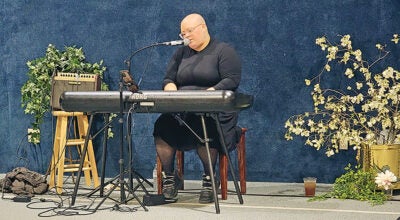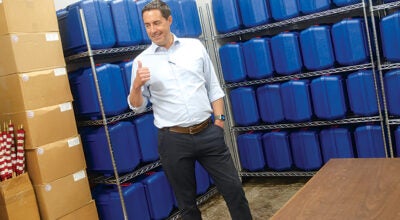Addiction issues discussed
Published 10:45 am Thursday, June 29, 2017
GOP candidate DeWine speaks in New Boston
NEW BOSTON — Ohio Attorney General Mike DeWine, fresh off his announcement of his candidacy for governor of Ohio, paid a visit to the southern part of the state on Wednesday, to discuss the opioid epidemic and addiction issues facing the region.
DeWine, 70, kicked off his campaign for the 2018 Republican nomination on Sunday at the DeWine Ice Cream Social, an event which takes place annually at his family homestead in Cedarville.
“We had about 200,000 people,” DeWine said of the crowd. “I’ve never seen anything like it before.”
DeWine is touting his experience and long career in government in his message, having served stints as attorney general, U.S. senator and lieutenant governor.
His visit to Scioto County took him to the Stepping Stone Outpatient Program in New Boston, where, accompanied by his wife, Frances, he met with staff of the nonprofit.
“I just wanted to have a chance to get brought up to date on Scioto County and the surrounding area and the opiate problem,” DeWine said.
Stepping Stone is a 501c3 and a counseling center, which works with mothers and mothers-to-be dealing with addiction.
“We’ve been here for 25 years,” Gina Collinsworth, the facility’s director said. “We’re one of the oldest dedicated to mothers.”
Collinsworth said what makes their group unique is that they allow mothers to bring their children to take part in the program.
“One of the things we always heard was “I don’t want to leave my kids,’” she said.
She said children are able to stay with their mother at the group’s treatment home, located near the counseling center.
Sean Davis, the director of crisis services for the group, said the group also operates a crisis center, a 10-bed facility, serving Scioto, Lawrence and Adams counties.
“We’re open 24 hours a day by referral,” he said, noting the service, funded in part by the Alcohol, Drug Addiction and Mental Health Services, is a cost-free, community-based project.
DeWine said Scioto County and nearby areas have more infrastructure in place to deal with the opiate crisis than some regions in the state.
“You’re a lot further along,” he said. “I think it may be, because the epidemic is more mature here.”
Scioto County’s battles with the opioid crisis, which began in the 1990s, have made national headlines, even inspiring a bestselling book, “Dreamland,” by investigative reporter Sam Quinones.
DeWine said he was told by staff at the meeting that the rate of increase for addiction in the area has slowed.
“There’s no indication that things have stabilized, but at the least, they have slowed down,” he said.
One proposal DeWine made is to require anti-drug education in every Ohio school, private and public, from kindergarten through twelfth grade.
He says a good deal of schools have educational programs, but not starting as early as kindergarten. Such programs would be adapted to student’s ages.
“In kindergarten they’re not going to learn about heroin, but we can teach them about wellness, health and decision making,” he said.
DeWine said studies have shown a continuous education can have an impact.
“If it’s done year after year, the numbers on addiction go down,” he said. “This one way we can get in front of this.”
He said, as attorney general, his office has produced a book outlining such programs and has sent to them to all of Ohio’s superintendents.
“When I become governor, I’m going to make sure every school does this,” he said, adding that there will also be flexibility and room for decisions at the local level in administering the program.
DeWine said he would also be focusing on employment in the state, stating that the addiction epidemic has impacted the job situation in Ohio.
“When I talk to employers around the state, many tell me, ‘I can’t find people to work here. I can’t find someone who can pass a drug test and I can’t find someone who has the required skills,’” he said.
He said that, in addition to preparing students for college, efforts should be made to educate them about other career paths.
“There are many options, as far as what they can do with their life,” he said. “It might be their dream to open an auto repair shop or to do welding.”
He said support and assistance should be available to those who choose a path other than college to pursue their goals.
“It’s important to say to kids, ‘That’s OK. I’m going to help you be a success in many ways,’” he said.
He said local career centers should increase their collaboration with businesses.
“Students can get internships or afterschool work,” DeWine said. “That way, they can figure out if they like the field of work or not.”
DeWine said a governor has two jobs, to provide leadership and to perform management.
On the management side, he said he would bring business leaders in, on a volunteer basis, to suggest ways to help improve efficiency in state government, something he said he saw done successfully by former Gov. George Voinovich, for whom DeWine served as lieutenant governor.
DeWine said he feels optimistic about his chances for winning his party’s nomination, in which he is running in a field including Ohio Sec. of State Jon Husted, U.S. Rep Jim Renacci and Lt. Gov. Mary Taylor.
Ohio’s current governor, Republican John Kasich, has served to terms and is limited from running again.
“I like the position we’re in,” he said. “The polling shows we’re winning in the primary by a very large margin. My job now is to articulate our message.”





